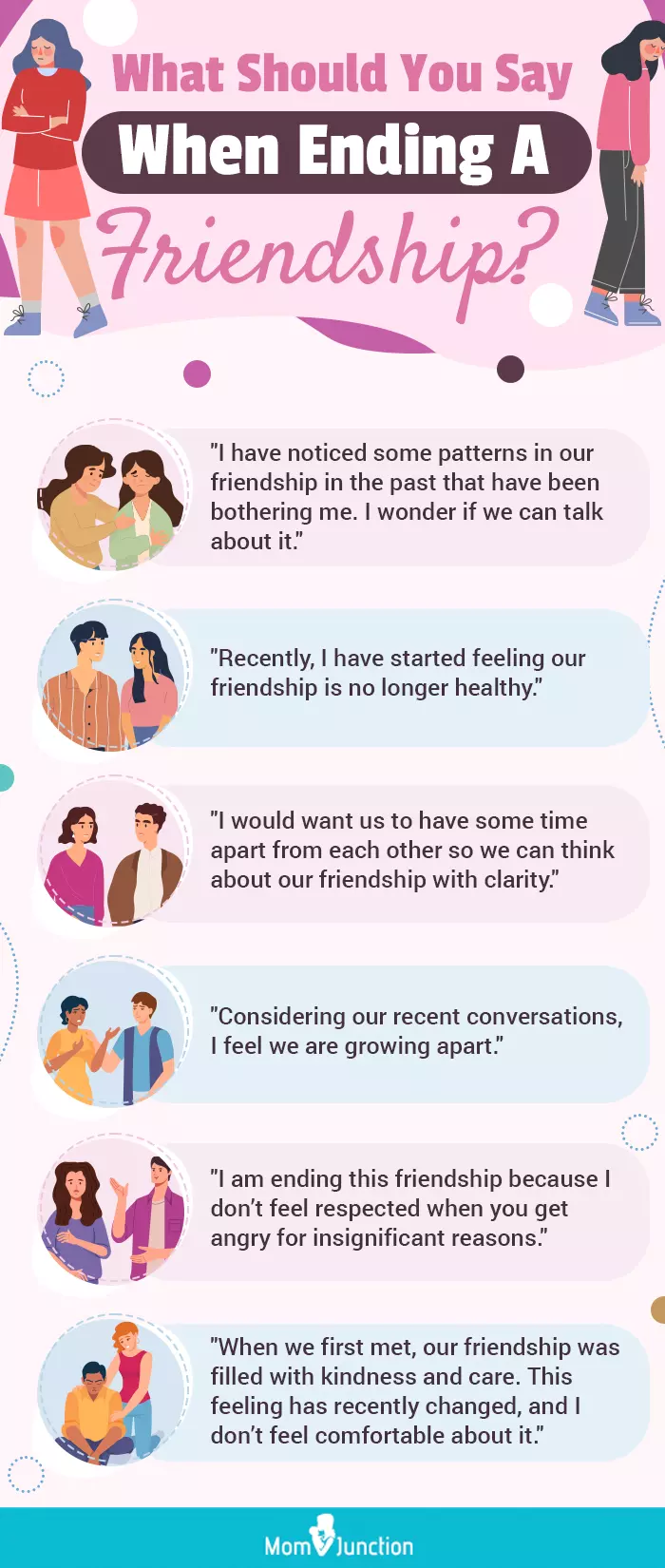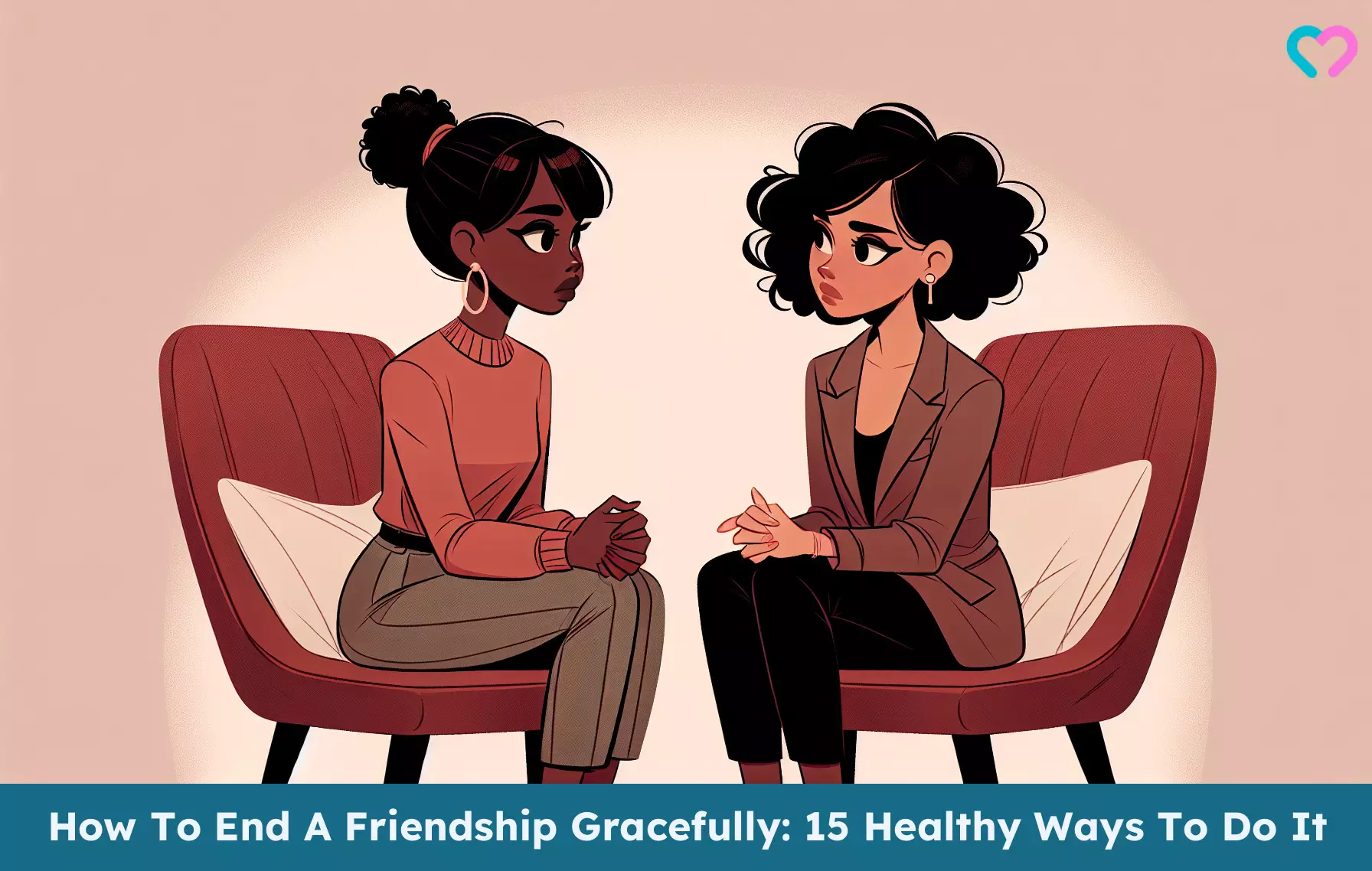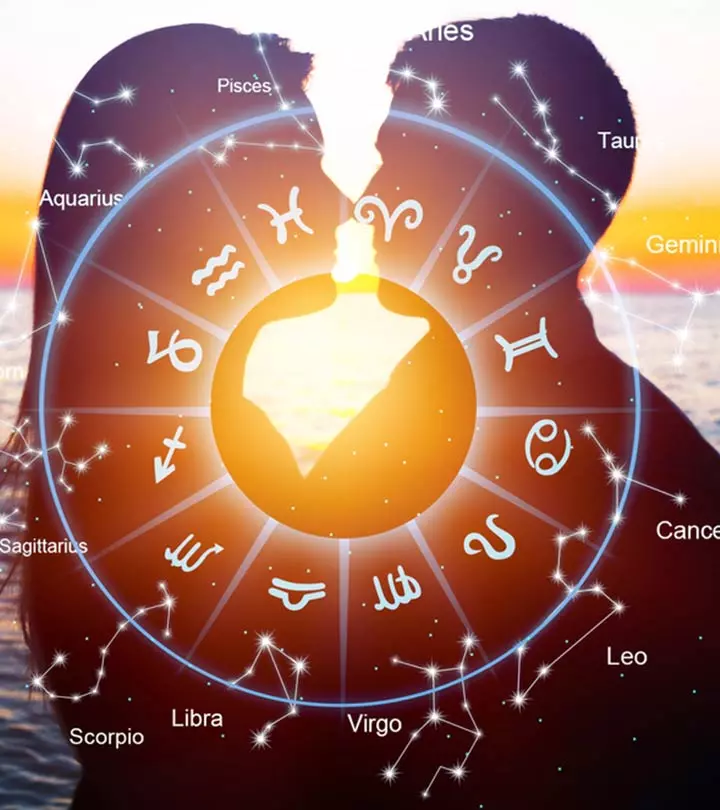
Image: Shutterstock
Friends are your biggest support system but friends that have become toxic can take a toll on your mental and physical health. If you want to know how to end a friendship, this post is for you. A good friend with whom you share a close connection is your biggest supporter, cheerleader, and critic. They stand by you through thick and thin. However, some people maintain friendship with you only because they need something and don’t offer support when you need them. It is important to identify such friends and cut ties with them. In this post, we have listed ways to end a friendship respectfully after browsing through multiple trusted websites, expert opinions, and research papers. Keep reading to know how you can approach this tough decision with sensitivity.
Key Pointers
- When your friend takes advantage of you, and you feel betrayed, it could be a valid reason to end the friendship.
- Before taking a step further, plan well about what you want to convey.
- Avoid miscommunication and inappropriate language. Instead, focus on how they made you feel.
9 Reasons To End A Friendship
Breaking a friendship can be heartbreaking, but sometimes, you may have to go through the tough task. As blogger Laura DeMaisBerg shares, “One of my oldest, best friends dumped me about six months ago. It’s strange because we used to talk every day. We lived within walking distance of each other. We’ve known each other since seventh grade. When I expressed my discontent with aspects of our friendship, instead of creating an opportunity to connect and deepen our relationship, it made her turn on her heels, walk quickly away from me, and shut the door to our friendship (i).”
If you are facing a similar situation and are unsure whether to continue your friendship with that special person, this post can help. Below are a few reasons why you may have to end a friendship.
1. They betrayed you
As per a study published in the Journal of Social and Personal Relationships, a common reason for ending a friendship or distancing from a friend is due to transgressions by them (1). So, if your friend borrows money from you and never pays back, spreads rumors about you, or tells you lies regarding important things, such as a family secret, you may have to evaluate whether you still want to be friends with them.
 Point to consider
Point to consider2. They bring negativity to your life
Your friend does not leave any opportunity to bring you down. They constantly complain, choosing to find fault in everything you do. They do not accept accountability for where they are at in life, and they want you to adapt to their negative outlook. For example, when you share an accomplishment with your friend, they bring up how much they dislike their job and how nothing is going right for them instead of congratulating you.
Blogger Celes ended her ten-year-long friendship for a similar reason. She states, “In a way, we started to hold each other back. His lack of growth made it difficult for me to move forward without feeling like I was compromising our friendship. This wouldn’t happen with a regular friend, but it was different for us because we were so close. I also felt sad knowing that he had all these goals he wanted to work on, but remained in stasis as years went by (ii).”
3. They take advantage of you

Image: IStock
Toxic friends will constantly ask for your help, such as borrowing money or a ride to some place, but when you need them, they either don’t respond or make excuses. If your friend does the same, your relationship may not be based on mutuality.
4. They don’t keep your secrets
Your friend constantly reveals sensitive information such as your vulnerabilities and family secrets you have shared with them in confidence. Even if you tell them to stop, they continue to gossip about your life’s secrets and do not hold your best interests or any interest in helping you feel safe.
 Do remember
Do remember5. They never have time for you
If your friend constantly ditches you for others with flimsy excuses, breaks plans, or never suggests ways to spend time together, it may indicate a one-sided friendship. Research states that the dissolution of friendships is linked with diminishing shared interests, values, priorities, personality traits, emotional bonds, and ways of enjoying life (2). If you’re experiencing this, it may be better to let the friendship fade rather than allow it to take up more of your time.
Blogger Niraj Shah has to say this about a similar situation that led to the ending of a friendship. He writes “In my view, every friendship is a two-way street, and both people need to care about it in order to accommodate and make it work. Throughout the time we knew each other, I cared about this friendship, and I did my part in expressing my needs and trying to accommodate hers as well. However, I felt that the effort wasn’t reciprocated on her end (iii).”
6. They don’t respect boundaries
Your friend repeatedly pushes you to do things you are uncomfortable with such as loud parties or interacting with people you don’t like. They don’t consider your schedule and call you at odd hours or expect you to drop everything to spend time with them. They deliberately bring up sensitive topics that you do not want to discuss. This is one of the signs your friend doesn’t respect you. They do not consider your best interests and so, you do not feel safe around them.
7. They begin to conflict with your values
The two of you do not share similar views on topics, such as honesty, integrity, or ethics. Your friend might be in a different stage of life and their beliefs might clash with yours. To continue being friends with them, you will have to change yourself or lie to them, and it will not feel good for you to be around them.
8. They don’t make you feel positive

Image: IStock
Your lives have taken different paths. Whenever you meet them, they constantly talk about how unfair things are, how nothing ever goes their way, or how they’re stuck in a rut. You feel depleted and negative after spending time with them, and they drain your energy.
9. They don’t support you
Mutual support is the bedrock of genuine friendships. However, when you are dealing with stress at work or a personal issue and reach out for comfort, they either don’t respond or act like it’s not a big deal. If you are always there for your friend, but they do not support you when you need them, they are a selfish friend who only knows how to take but not give.
15 Healthy Ways To End A Friendship
If you think ending a friendship by meeting in person is a better idea than writing a letter, sending an email or texting, here are a few tips for proper closure.
1. Plan what you are going to say
Before meeting your friend in person to part company, carefully plan what you want to say. Keep in mind the specific issues or incidents you want to address. You could also write them down. Preparing in advance will help you share your reality while not forgetting what you wish to say – even if you are agitated. However, let your friend have their say too. Don’t overwhelm them by talking continuously. Let it be a healthy discussion.
2. Avoid blame games or bad language
Blaming your friend or hurling insults can cause rupture and the situation can get out of hand. To handle it gracefully, put forward your point of view calmly without using any foul language. Using “I feel” statements will help you share how they have affected you without overly criticizing them. Even if your friend raises their voice or insults you, maintain your cool. Quarrels can make it difficult for you to have a proper discussion and diminish the possibility of ending the friendship peacefully.
3. Focus on your feelings, not their faults
Instead of focusing on your friend’s mistakes, weave the conversation around your feelings. If you accuse them and hold them accountable for everything, they might become defensive. Use “I” or “We” rather than “You.”
You can tell them that you are not happy with the way things are going between you. However, avoid making unspecific and rude comments. Instead, communicate the impact of their behavior on you. For instance, you can say, “I was hurt when you couldn’t make time for me during my tough time last year.”
4. Communicate clearly

Image: IStock
Is this the end of the friendship or just a break? If it is a break, how long will it be? Are you completely cutting off contact, or will you exchange pleasantries sometimes? If you come across each other, what should be the right approach? Communicate the time frame and boundaries clearly so that there is no confusion or problem in the future.
5. Share the load
Your main objective is to annul and dismiss the friendship on an amicable and healthy note. If you hold them solely responsible for everything wrong, it will only complicate the matter. Instead, share the responsibility by using a few “we” statements. For example, say, “Lately, we haven’t seen eye to eye on a lot of things.” Don’t say, “You are always ready for a fight.”
6. Avoid going round in circles
If you want to end the friendship quickly and painlessly, avoid discussing incidents of the past. A long, drawn-out conversation may take you off the track. If your friend is a toxic person, they might try to argue and pull you down or manipulate you to change your mind. They may also try to put the blame on you. Once you have made up your mind, be firm about your stance on ending the friendship.
 Quick tip
Quick tip7. Wish them the best for the future
If they were a good friend, they deserve kind treatment. They once meant something to you, so make it easier for them. Be the bigger person and sincerely wish them well for the future. Acknowledge the good times you have shared and end on a positive note so that both of you will feel better when you look back at your relationship.
Here are a few other ways to end a friendship smoothly and gracefully.
8. Let the friendship come to its natural end
Instead of ending the friendship abruptly, let it fade away gradually over time. You won’t have to explain anything or hurt their feelings. Distance yourself by reducing the overall communication or not answering their calls and responding to their texts immediately. Decrease the frequency of calls and face-to-face meetings too.
9. Take some time out
If the friend was dear to you, it might not be easy to end the friendship. Sometimes, a little time apart can serve as a “cooling off” period. However, sometimes, the distance might open your eyes to the fact that the friendship has run its course. The timeout can simplify the task of ending the friendship. Maybe your friend will glide into the separation, and the bitterness can be avoided.
10. Cut off contact completely
While it is good to end a friendship amicably, it might not always be possible. If your friend is mentally or physically abusive, controlling, obsessive, or has threatened your safety, then a discussion might not be an option. Block them on your phone and all your social media handles. Also, inform your mutual friends about the toxic situation.
11. Maintain distance from them
Once you have communicated that you want to cease the friendship, you can distance yourself from them. If you work together, study in the same college/school, or are in the same group, moving away from them completely may not be possible. However, you can minimize the interactions with them. If you work together, keep your interactions strictly professional. If they try to start an argument or harass you, tell them to stop politely but firmly and discontinue all communications with them.
How To End A Friendship By Text?

Image: IStock
If your friend turns violent or sentimental, text them to resolve the matter subtly.
12. Convey your discomfort by texting, “We are not on the same page anymore”
If the two of you have different values that constantly lead to disagreements, text them something like, “While we have had fun times together, my beliefs and interests are different to yours at this stage, ”or “Our lives are on diverse paths, and we have grown apart.” If they ask for specifics, you can give a prominent and latest example.
13. Express your pain with, “Our friendship is fractured beyond repair”
If they have broken your trust and spoken ill about you, be upfront about it. Text them about how you felt rather than harping about how bad they are. Avoid getting into too many details. It is okay to touch upon their latest indiscretion if required, but don’t use any loaded words.
For instance, you may text, “I am truly hurt that you chose to lie to me repeatedly and gossip about me behind my back.” “A healthy friendship is based on mutual trust and respect. I don’t think our relationship can ever recover from this.”
14. Text you have grown apart, “We don’t connect so well”
If you have drifted apart and feel that your friendship has become an obligation, you may end it by saying, “We were great friends, however, I don’t feel the connection anymore” or“ This is not an easy decision, but I don’t see the point in forcibly stretching this relationship anymore. Let’s go our separate ways.”
15. Communicate your need with a text, “My well-being is my priority”
You may want to disengage because the person constantly humiliates and brings you down. In such a scenario, let them know that the friendship negatively affects you by texting, “I need to focus on my emotional wellbeing and rebuild my confidence. Our friendship is taking a toll on me, and it is not healthy for me to continue it any further. I wish you well for your future.” While there might be some disparaging remarks and insults from their end, avoid getting into an argument and let it go – take the high road.
What To Do When Your Friendship Is Over?
Ending a friendship with a toxic friend can cause loneliness, stress, anxiety, and self-doubt. If you’re feeling this way, here are steps to take after ending the friendship that can help you feel better.
- Accept that the friendship is over and avoid reaching out to them.
- Acknowledge your feelings, whether it is sadness, loneliness, or anxiety.
- Give yourself time to grieve and do things that bring you joy.
- Reflect on the positives of the friendship to understand what went wrong.
- Stay motivated and focus on other relationships.
- Spend time with other friends or family who make you happy.
- Try to meet new people and make new friends.
- Focus on self-care and growth from the experience.
Frequently Asked Questions
1. How do you know a friend doesn’t care about you?
A friend who does not care about you, avoids meeting you by frequently canceling plans, does not include you in their inner social circle, seems distant, always blames you for everything, is not with you in your tough times, and does not feel happy about your accomplishments. If you have such a friend, you should distance yourself from them.
2. Are female friendships more fragile?
Female friendships can be more fragile than male friendships. However, it is believed that women discuss their vulnerabilities and fears with their close friends more than men. Therefore, women’s friendships are more intense and fragile.
3. Is it cruel to end a friendship?
Ending a friendship can be challenging but sometimes essential. It may result in emotional pain, but it is not inherently cruel if handled respectfully and honestly, prioritizing personal well-being and growth.
4. How long does the average friendship last?
The average duration of a friendship can differ due to factors like personal circumstances, life changes, and personal dynamics. Some friendships endure for a few years, while others stand the test of time and last a lifetime.
5. Why is ending a friendship so hard?
The challenge of ending a friendship arises from the need to break a connection with someone we once deeply cared for and shared meaningful experiences with. It often brings forth emotions of loss, guilt, uncertainty, and the fear of causing or experiencing pain from the separation.
6. Should I tell mutual friends about the end of the friendship?
Determining whether to inform mutual friends about the end of a friendship depends on individual choices and the specific situation. While sharing your perspective can be beneficial, it’s crucial to consider the privacy and emotions of everyone involved and act accordingly.
7. Can friends gaslight me?
Yes, friends can engage in gaslighting behavior, manipulating and distorting your perception of reality, causing you to doubt your experiences, emotions, and sanity. Identifying and confronting a narcissistic friend who is showing such behavior is crucial to fostering healthy and supportive relationships.
8. What signs indicate a friendship is toxic?
When your friends are toxic, you feel drained after meeting and interacting with them. They constantly criticize you and your choices and are not by your side when you need them. They make you feel negative about yourself, undervalue you, and lie to you. If you notice such traits in your friendship, consider ending it.
How to end a friendship and nip it in the bud? There is no easy way for it, as friendship breakups do hurt. However, if you decide to part ways, there should be a strong reason, and it’s bound to be upsetting and mournful. It’s natural that you will feel a rush of negative emotions to reach the end, but it’s important not to be engrossed in the bitterness of the situation. So, properly plan what to communicate. Also, remember that time heals everything, and it might bring a better future.
Infographic: Words To Be Used When Ending A Friendship
It is often said that friends are our chosen families who support us in all phases of our life. However, sometimes, the friendship might end due to unfortunate circumstances or misunderstandings. Ending a good friendship is difficult, and one must handle it carefully to avoid lasting bitterness. This infographic helps you to choose the right words for ending a friendship. Illustration: Momjunction Design Team
Illustration: How To End A Friendship Gracefully: 15 Healthy Ways To Do It

Image: Dall·E/MomJunction Design Team
Personal Experience: Source
MomJunction articles include first-hand experiences to provide you with better insights through real-life narratives. Here are the sources of personal accounts referenced in this article.
i. Goodbye old friend;https://medium.com/illumination/goodbye-old-friend-b3b7d0a9e020
ii. Why I Parted Ways With My Best Friend of 10 Years
https://personalexcellence.co/blog/end-friendship/
iii. Why I ended a friendship: Reflections on growth, clarity, and self-worth
https://medium.com/%40nirajshah2003/why-i-ended-a-friendship-reflections-on-growth-clarity-and-self-worth
References:
- Thomas H Khullar et al.; (2021); Relationship dissolution in the friendships of emerging adults: How, when, and why?
https://pmc.ncbi.nlm.nih.gov/articles/PMC8573342/ - Alyssa Shapiro; (2024); Friendship Dissolution: An Unspoken Loss During Emerging Adulthood
https://digitalcommons.liu.edu/cgi/viewcontent.cgi?article=1077&
Community Experiences
Join the conversation and become a part of our nurturing community! Share your stories, experiences, and insights to connect with fellow parents.
Read full bio of Jason Polk
Read full bio of Shikha Thakur
Read full bio of Akshay Nair
Read full bio of Benidamika J Latam
















